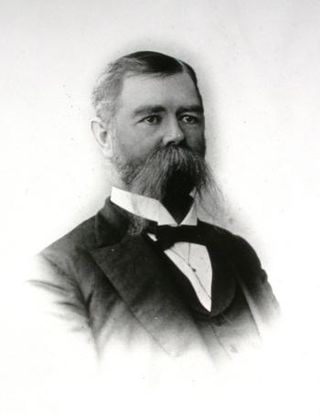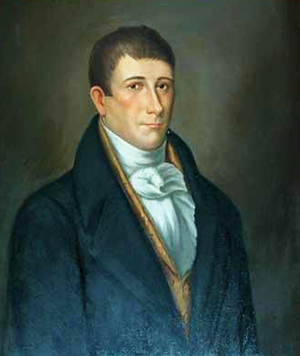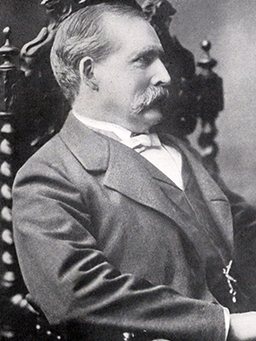Related Research Articles

Nash County is a county located in the U.S. state of North Carolina. As of the 2020 census, the population was 94,970. Its county seat is Nashville.

Edgecombe County is a county located in the U.S. state of North Carolina. As of the 2020 census, the population was 48,900. Its county seat is Tarboro.

Rocky Mount is a city in Nash and Edgecombe counties in the U.S. state of North Carolina. The city's population was 54,341 as of the 2020 census, making it the 20th-most populous city in North Carolina. The city is 45 mi (72 km) east of Raleigh, the state capital.

Elias Carr was an American planter, lawyer, and politician who served as the 48th governor of the U.S. state of North Carolina from 1893 to 1897.

Benjamin Williams was the 11th and 14th Governor of the U.S. state of North Carolina, from 1799 to 1802 and from 1807 to 1808. He was the first of two North Carolina Governors since the American Revolution to serve nonconsecutive terms.

Samuel Johnston was an American planter, lawyer, Grand Master of Freemasons, slave holder, and statesman from Chowan County, North Carolina. He represented North Carolina in both the Continental Congress and the United States Senate, and he was the sixth Governor of North Carolina.
Timothy James Bloodworth was an American anti-Federalist politician. He was a leader of the American Revolution and later served as a member of the Confederation Congress, U.S. congressman and senator, and collector of customs for the Port of Wilmington, North Carolina.

John B. Weller was the fifth governor of California from January 8, 1858, to January 9, 1860, who earlier had served as a congressman from Ohio and a U.S. senator from California, and minister to Mexico.

Battleboro is a former town and community in the city of Rocky Mount in Edgecombe and Nash counties of North Carolina, United States.

Big Star was an American supermarket chain founded in 1937 as part of the David Pender Grocery Company.

The president pro tempore of the North Carolina Senate is the highest-ranking officer of one house of the North Carolina General Assembly. The president of the Senate is the Lieutenant Governor of North Carolina, but the president pro tempore actually holds most of the power and presides in the absence of the Lt. Governor. The president pro tempore, a senior member of the party with a majority of seats, appoints senators to committees and also appoints certain members of state boards and commissions. From 1777 to 1868, North Carolina had no Lieutenant Governor, and the highest-ranking officer of the Senate was known as the "Speaker". The Speaker of the Senate was next in line if the office of Governor became vacant. This occurred on two occasions.

William Ruffin Cox was an American soldier and politician from the state of North Carolina. He was a brigadier general in the Confederate Army during the Civil War, a three-term member of the United States House of Representatives from 1881 to 1887, and Secretary of the Senate from 1893 to 1900.

The Rocky Mount, NC Metropolitan Statistical Area, as defined by the United States Census Bureau, is an area consisting of two counties – Edgecombe and Nash – in eastern North Carolina, anchored by the city of Rocky Mount. As of the 2010 census, the MSA had a population of 152,392. It is commonly referred to as the Twin Counties.

Simmons Jones Baker was a physician, planter, legislator, and slave owner in North Carolina.

John Hosea Kerr Jr. was an American lawyer and politician.

J. Chris Wilson is an American Southern regionalist artist, known for his portrait paintings of the North Carolina scenic landscapes. Wilson's paintings were the first to be featured in the North Carolina House of Representatives Chamber of the North Carolina Legislative Building. He was the first artist-in-residence at Barton College.
The North Carolina General Assembly of 1780-1781 was the fourth elected legislative body of the State of North Carolina. The assembly consisted of a Senate and House of Commons that met in three sessions in at least two locations in the years 1780 and 1781. Each of the existing 50 North Carolina counties were authorized to elect one Senator and two members of the House of Commons. In addition, six districts also elected one House member each. The first two sessions were probably held in New Bern, North Carolina in April and September 1780. The third session met in Halifax from January 27, 1781 – February 13, 1781.

The North Carolina Constitutional Convention of 1835 was a meeting of delegates elected by eligible voters in counties in the United States state of North Carolina to amend the Constitution of North Carolina written in 1776 by the Fifth North Carolina Provincial Congress. They met in Raleigh, North Carolina from June 4, 1835, to July 11, 1835, and approved several amendments to the constitution that were voted on and approved by the voters of North Carolina on November 9, 1835. These amendments improved the representation of the more populous counties in the Piedmont and western regions of the state and, for the first time, provided for the election of the governor by popular vote rather than election by the members of the General Assembly.

William Eleanor Kearny Carr was an American planter and political hostess who served as the First Lady of North Carolina from 1893 to 1897 as the wife of Governor Elias Carr. She was a charter member and librarian of the first North Carolinian chapter of the Daughters of the American Revolution.
Adelphia Plantation also called the Garrett-Wiggins House or the Garrett-Wiggins-Brown House, is a historic plantation house in Edgecombe County, North Carolina near the towns of Tarboro and Pinetops. The Italianate style house was built in 1854 for Joseph John Garrett.
References
- 1 2 3 4 5 Johnston, Hugh. "General Louis Dicken Wilson".
- 1 2 Fleming, Monika. Echoes of Edgecombe County, North Carolina. Arcadia Publishing, 1999. ( ISBN 0752405306)
- ↑ Fleming, Monika. Edgecombe County: Along the Tar River. United States: Arcadia Publishing, 2003. ( ISBN 0738524123)
- ↑ Fleming, Monika (2000). Echoes of Edgecombe County, 1860-1940. Charleston, SC: Arcadia Publishing. p. 80. ISBN 0752405306.
- ↑ Wheeler, John (1851). Historical Sketches of North Carolina: From 1584 to 1851, Compiled from Original Records, Official Documents and Traditional Statements ; with Biographical Sketches of Her Distinguished Statesmen, Jurists, Lawyers, Soldiers, Divines, Etc. Philadelphia, PA: Lippincott, Grambo and Company. p. 144.
- 1 2 "Wilson, Louis Dicken | NCpedia". www.ncpedia.org. Retrieved 2018-07-10.